
Overview of school programs for grade 1 for 2025
Parents of future first-graders, when applying for education, are concerned about the question of which school their child will study at. However, an equally important point is the choice of an educational and methodological program, according to which the development of academic disciplines will take place. We offer an overview of popular school programs for grade 1 for 2025, indicating the strengths and weaknesses of each.
Content [Hide]
What are the learning systems in grade 1
According to GEF, primary education can be based on one of two systems:
- traditional, carried out according to the algorithm: learning new material - consolidating what has been learned - testing knowledge and skills;
- developing, characteristic only for elementary grades: an algorithm for search activity - independent search and conclusions - a practice that includes the development of cognitive actions.

If you find out who each system is suitable for, then the one that develops in complexity is available only to a child with a high or average level of training and development of mental processes. The traditional one is suitable for all children without exception, since it contains the moment of explaining new material by the teacher with the obligatory consolidation and testing of knowledge.
Overview of school programs for grade 1 for 2025
Traditional learning
School of Russia
votes 103
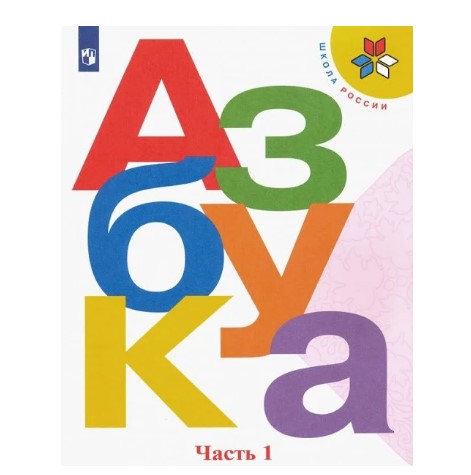
The most demanded program for grade 1 in our country, which fully complies with the Federal State Educational Standard, is used in the vast majority of schools, is constantly being improved and finalized under the auspices of the supervisor A.A. Pleshakov. The popularity of the program is due to several reasons:
- several generations of domestic schoolchildren learned from it;
- basic subject knowledge, skills, abilities are given;
- the classical educational system is constantly supplemented by new technologies;
- allows you to successfully learn prepared and unprepared children, with different levels of abilities;
- involves systematic preparation for the delivery of All-Russian test papers of various levels of complexity;
- accessible presentation of the material in textbooks.
Much attention is paid to the social adaptation of the child among peers for further moral education and spiritual development. First-graders are instilled with important personal qualities that will later determine integrity and tolerance: kindness, responsiveness, responsibility, justice.A plus is the use of excerpts from the best classical works for children by Russian and Soviet authors for educational purposes.
The methodology of each academic discipline is aimed at the full mastery of conscious reading, writing, counting. In the process of learning, the basic skills and abilities necessary for successful study in the middle classes are formed. UMK has numerous additional aids for using them at home for self-consolidation and repetition of what has been learned in the classroom.
- simplified system without unnecessary bells and whistles;
- easily digestible by any child;
- increases active cognition;
- instills a desire to learn;
- distributed in all schools;
- parents can easily help the child;
- WMC is based on works of classical children's literature.
- tasks of the reproductive type;
- few logical exercises.
Primary school of the 21st century
votes 47
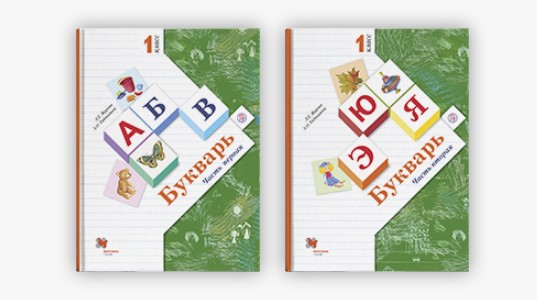
Recommended for mass implementation in elementary school, the CMC, compiled by a team of outstanding teachers and psychologists under the leadership of N.F. Vinogradova, is based on three principles:
- Development of interest in learning new things.
- Pawning solid knowledge, skills and abilities that will allow you to successfully study in the future.
- Accounting for the characteristics of each child.
Textbooks and additional aids are designed to ensure comfortable assimilation of the educational material of elementary school from the first days.
Learning under this program, as many parents note, allows the child to quickly become independent and responsible, painlessly enter the new school world, and not lose cognitive interest.As a result, first-graders cope with their homework on their own without resorting to outside help, go to school with pleasure, and develop successfully. However, there are a number of comments and suggestions regarding the compilation of textbooks for their more effective work.
- individual approach to motivate the child;
- a long period of adaptation to study without stress;
- encouraging the natural curiosity of first-graders;
- colorful textbooks with an accessible presentation of the material;
- Lots of practice exercises to reinforce what you have learned.
- often the topics of textbooks and workbooks do not match;
- there is no clear definition of rules in textbooks.
perspective
votes 44
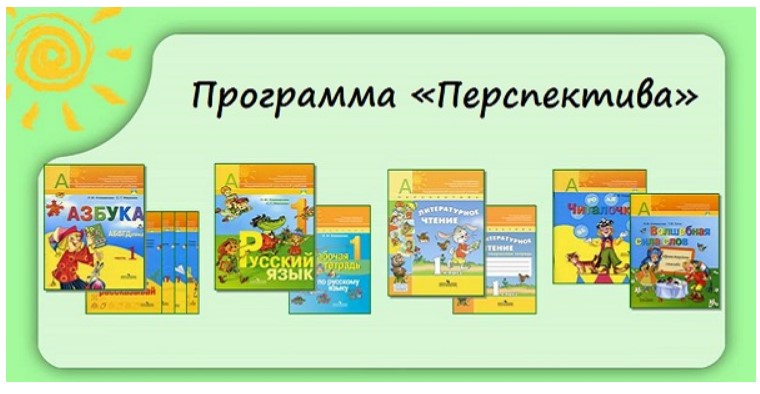
One of the most popular, created by L.G. Peterson, perfectly combines modern achievements in psychological and pedagogical sciences and the best aspects of the classical Soviet school. It has a number of undeniable advantages and unique features:
- Training is conducted through communication: separate topics are devoted to the formation of the skills to conduct a dialogue, politely address the interlocutor, and express one's own opinion. Most of the tasks are aimed at understanding the communication of the heroes of works of art and its consequences.
- An extraordinary approach to learning new things: pair, group, collective work, discussions, defending one's point of view.
- The main skill is independence: all tasks and exercises in textbooks and additional manuals are aimed at its formation: problematic questions, materials for observation and analysis. The child learns to acquire knowledge himself. Using methods of observation, analysis, generalization.
- The predominance of oral speech: reading cognitive texts and literary works is devoted to this, followed by oral statements of schoolchildren, mastering the most popular genres of literature. Children learn to correctly formulate thoughts, prove their opinion, communicate politely in a conversation.
- Available explanations: assignments, text tasks, learning situations are based on life examples that are understandable to first-graders, which increases interest in learning.
- A wide range of additional aids for each school subject: dictionaries, workbooks, readers, books for reading, notebooks for grades.
However, parents of first-graders invariably note a minus in the educational and methodological complex: some inconsistency in the presentation of the material, which creates confusion when trying to help children with homework. Undoubtedly, the authors of the textbooks proceeded from the importance of developing basic skills and abilities, a knowledge base that will facilitate the adaptation of primary school graduates when they move to grade 5. However, to start it from the first class is quite controversial. The thematic plan for the surrounding world is full of material, there are topics that are not important enough for first-graders to master.
- simple learning algorithm;
- colorful textbooks;
- a large number of additional benefits;
- teaches full communication;
- develops the skill of oral speech;
- original approach to learning;
- all-round development of independence.
- complex program in mathematics;
- voluminous homework.
Harmony
votes 23
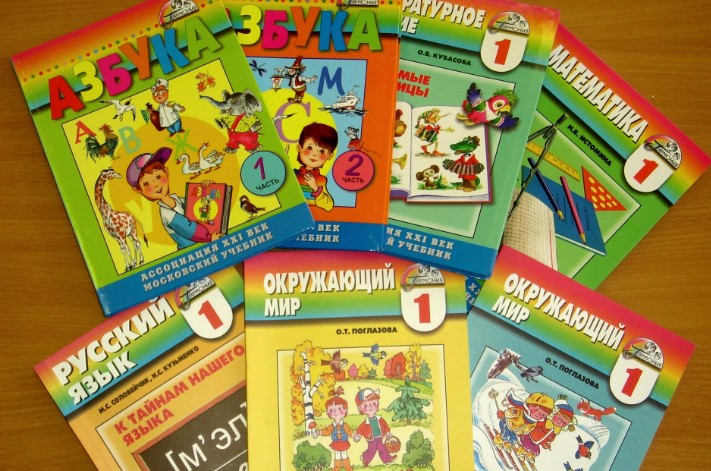
The educational and methodological complex, developed under the guidance of N.B. Istomina, meets all the requirements of the Federal State Educational Standard, combines the principles of traditional and developing forms of education and includes 12 textbooks in all school disciplines, including French, physical culture, technology and the spiritual and moral culture of the peoples of our countries. Each textbook has an additional manual in the form of a workbook, an electronic resource, a notebook for assessments, and a book for reading. Much attention is paid to the use of the methods of mental activity of first-graders for solving educational problems: in tasks they are asked to analyze, compare, generalize information, and draw conclusions. Also, many exercises are given to use the empirical experience of the child when compared with the problem task.
The specifics of the organization of educational activities provides a comfortable and exciting entry into school life, with an emphasis on independent work. From the first day of study, each child begins to fill out a portfolio of their results and achievements, which is the basis for the assessment mechanism.
- emphasis on the mental development of the child;
- the predominance of problem situations in tasks;
- differentiated approach;
- electronic versions of textbooks and applications;
- additional didactic material for studying at home;
- a combination of traditional and innovative ways of learning.
- preparation for school is required;
- the predominance of theoretical rules over illustrations in textbooks;
- the sequence in the study of the Russian language and mathematics is not always observed.
School 2100
votes 22

The classical concept of the education system, the features of which are continuity at each level of education, a skillful approach to using acquired knowledge, consistent and continuous performance by a first-grader of each individual educational task in a single complex. Ideally, the teaching staff covers the primary, secondary and senior levels of the general education school. A large amount of educational material is assimilated thanks to the search activity of first-graders with the function of control by the teacher.
Mathematics and the world around us cause the greatest difficulty in mastering, according to the parents of first-graders. However, with successful completion of training, as a result, the child acquires the skills and abilities necessary for self-education, receives a solid knowledge base in the field of all school disciplines, which has a beneficial effect on future admission and study at a higher educational institution.
- students acquire knowledge on their own;
- obligatory control of the teacher;
- contributes to the development of horizons;
- helps to master the skills of searching for information;
- a lot of practice in the field of writing summaries, essays, essays.
- tasks are unbearable for poorly prepared first-graders;
- parental supervision and assistance is required;
- not all schools maintain continuity in the 5th grade.
planet of knowledge
votes 14
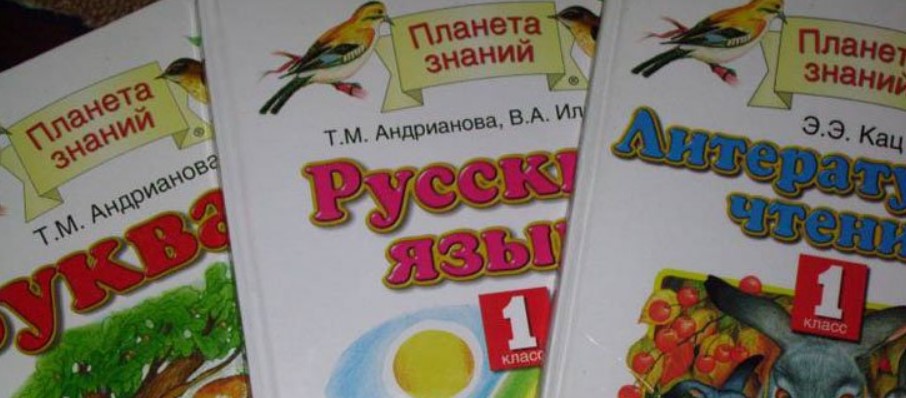
The team of authors led by Irina Petrova tried in their program, compiled according to all the standards of the Federal State Educational Standard, to pay attention not only to subject lines in basic school disciplines, but also to the basics of ethics and the English language, which is important for modern children. The authors of the project are distinguished by unity in the structure of textbooks, types of tasks and exercises, and forms of education.The organization of educational and extracurricular activities is also carried out in unity.
The key term of the program is the word "self":
- self-development;
- self-discipline;
- self improvement;
- self-organization.
In textbooks, in addition to the basic invariant part, there is also a variable part, which allows first-graders to broaden their horizons. Educational material is presented in a colorful and interesting way. WMC was highly appreciated by practicing teachers. In their opinion, children develop better thinking and creative abilities, they become more assiduous and attentive.
The only downside is that the successful acquisition of basic knowledge, skills and abilities is not based on the gradual study and repeated repetition of the past, as provided for in classical projects. First-graders enrolled in this program must necessarily have an average or high level of preparation for school, at least be able to count, read and write. Otherwise, all gaps fall on the shoulders of the parents.
- unity of didactic approach;
- the relationship and integrity of the project;
- emphasis on the development of student independence;
- electronic supplements to textbooks.
- difficult for an unprepared first-grader;
- in literary reading, the emphasis is on foreign works.
Developmental learning
L.V. Zankov's program
votes 17
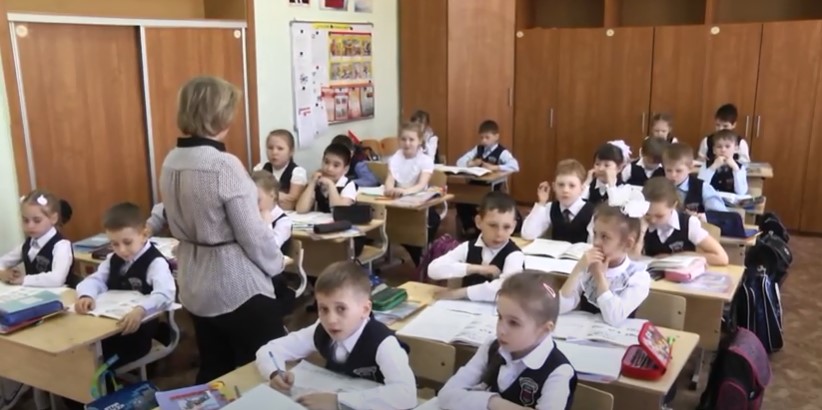
The didactic system founded by L.V. Zankov on the main pedagogical and psychological postulates put forward by L.S. Vygotsky: the zone of proximal development of the child, which can and should be developed with the help of a teacher, as well as the dependence of the mental development of a younger student on teaching methods.This program is distinguished by a high level of complexity, a large amount of material studied, the absence of templates and solution algorithms, an abundance of search and creative tasks, and dialogue with the student. Emphasis is placed on independent search activities of students, theoretical knowledge, empowerment and acquiring solid knowledge along with general development.
- development of all mental processes;
- leads to high academic achievement of children;
- the first year of assessment is not put;
- active influence on the zone of proximal development.
- a lot of theory;
- difficult to buy textbooks;
- fast paced learning.
The system of D.B. Elkonin - V.V. Davydov
votes 18

The popular developing program, developed by Soviet psychologists D.B. Elkonin and V.V. Davydov, is built according to a scheme different from traditional programs, therefore it is quite complicated. Much depends on the qualifications and preparedness of the teacher. Suitable for children with a high level of preparation for school. However, when using an individual approach, even weak students are able to learn from it, gaining solid deep knowledge. The authors of the project consider the formation of the need to learn in a first-grader as the main thing. Therefore, all teaching methods and techniques are aimed at this:
- trap tasks - intentional errors of the teacher help to check any information first and make sure of its reliability;
- games - didactic, story, role-playing, business games are used everywhere in every lesson to enhance and develop mental activity;
- subject-practical activity: research, experiments, observations, measurements;
group and collective forms of work in the classroom.
For the manifestation of creativity and imagination, a prerequisite is the relaxed and free behavior of the student in the lesson, which the teacher takes care of in order to create a relaxed and friendly atmosphere.
- deep knowledge;
- an abundance of methods and techniques of search activity;
- conscious motivation to study;
- emphasis on logical thinking and theoretical knowledge;
- lack of diaries and grades.
- complex level of taught disciplines;
- a large amount of homework;
- inconsistency with traditional programs.

At first glance, it may seem that there are too many educational programs for grade 1. However, it is this diversity that allows parents to study the primary information about each and choose the most suitable for their child for a comfortable and successful mastery of knowledge.
Popular Articles
-

Top ranking of the best and cheapest scooters up to 50cc in 2025
Views: 131652 -

Rating of the best soundproofing materials for an apartment in 2025
Views: 127691 -

Rating of cheap analogues of expensive medicines for flu and colds for 2025
Views: 124520 -

The best men's sneakers in 2025
Views: 124034 -

The Best Complex Vitamins in 2025
Views: 121940 -

Top ranking of the best smartwatches 2025 - price-quality ratio
Views: 114981 -

The best paint for gray hair - top rating 2025
Views: 113396 -

Ranking of the best wood paints for interior work in 2025
Views: 110319 -

Rating of the best spinning reels in 2025
Views: 105330 -

Ranking of the best sex dolls for men for 2025
Views: 104367 -

Ranking of the best action cameras from China in 2025
Views: 102217 -

The most effective calcium preparations for adults and children in 2025
Views: 102012
